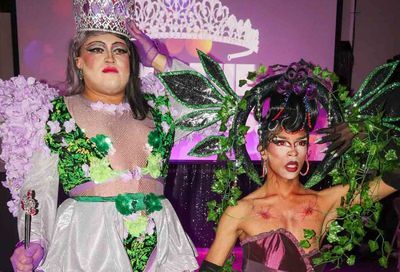‘Topdog/Underdog’ is a Potent Tale of Scarred Souls (Review)
Round House's "Topdog/Underdog" is a passionate examination of the simple human wish to not just survive, but to thrive.

Like a fever-dream, Roundhouse Theatre’s production of Suzan-Lori Parks’ Topdog/Underdog hovers in the psyche long after the play’s crescendo.
Set during a pivotal few days in the co-mingled lives of brothers Lincoln and Booth, the experience hangs in the mind, delivering not just aftershocks from its jarring conclusion but an ongoing realization of how much symbol and meaning Parks has packed into this two-man battle of wits, psychology, and scarred souls.
The tale begins with a down-on-his-luck Lincoln who is staying with Booth in his boarding house room, its mood of urban deprivation nicely evoked by Meghan Raham’s neon-lit set. The men are scratching out a living, with Booth emulating Lincoln’s past life as a hustler ripping off tourists with street-corner three-card-monte.
Lincoln, on the other hand, is trying to go straight, clinging to a job posing as his presidential namesake so tourists can re-enact the historic assassination. In just one of Parks’ many ironies, Lincoln — a Black man — must don whiteface to play a freer of slaves.
It is soon clear that the brothers have an uneasy connection, and a competitiveness emerges with Lincoln trying to dissuade Booth from the hustler’s life while asserting his own prowess at the game. As pressures mount, the cards become a proxy for the question of who really knows what it takes to “win.”
In another of Parks’ symbolic turns, the “loser” card changes from black to red as the brothers each become the dealer, suggesting racial comment and harbinger of violence, respectively.
Parks infuses the play with a certain music in her use of language, vernacular, and even the cyclical donning and shedding of garments. And there is no doubt that carrying this jazz-like “score” and Parks’ freighted symbolism — all while delivering her driving slice-of-life tale — is no small feat. Here, director Jamil Jude largely gets it right, bringing a keen energy to the highs, lows, and in-betweens.
But there are times when the actors feel too rushed in meeting the moments of intensity and it crowds the language, dampening its clarity and impact. Jokes are lost in the fray, as are some of the faster asides that — knowing Parks — are bound to be telling.
Another challenge is Parks’ interest in expository and the way she sits it in juxtaposition to the play’s interactive flow. Here — even accepting the slightly surreal capsule in which Parks’ characters explore their past and present — the moments when the men pause to recount a memory or revelation never quite transcend the contrivance. Parks may set the problem, but it was up to Jude to find a way to make it work.
Ro Boddie as Lincoln and Yao Dogbe as Booth each deliver riveting performances that genuinely honor the material. That said, they differ in approach and it’s just enough to dilute the chemistry of the characters and their connection as brothers. Dogbe feels — for want of a better word — “method” in his portrayal, bringing an immersive naturalism that peaks in the final moments.
In contrast, Boddie delivers his man with precision crafting and plays it to the rafters. Defined and charismatic as they each are, it’s hard to believe these characters shared the same dysfunctional past, even assuming they parted young and went their separate ways. The lack of cohesion dampens their repartee and makes it harder to feel the ties that bind.
And, as devastating as the final endgame is, thanks to Dogbe’s unfettered investment as Booth, the production never quite surmounts Parks’ choice to submerge so much of his fragility before the pressures mount. It makes sense, based on a painful childhood, that he might adopt a persona as a somewhat manic chancer, but there is little to explain where he lands in the play’s final moments.
Those who study violence are unequivocal: even when people say, “It came out of nowhere,” it turns out there were always signs. If director Jude and Dogbe had figured out a way to bring this in, it would have brought even more to this interpretation.
Even if Round House’s production doesn’t quite overcome all of the challenges of this complex play, it is nevertheless a passionate examination of the simple human wish to not just survive, but to thrive.
Topdog/Underdog (★★★☆☆) runs through June 23 at Round House Theatre, 4545 East-West Highway, in Bethesda, Md. Tickets are $39 to $103. Call 240-644-1100 or visit www.roundhousetheatre.org.
Support Metro Weekly’s Journalism
These are challenging times for news organizations. And yet it’s crucial we stay active and provide vital resources and information to both our local readers and the world. So won’t you please take a moment and consider supporting Metro Weekly with a membership? For as little as $5 a month, you can help ensure Metro Weekly magazine and MetroWeekly.com remain free, viable resources as we provide the best, most diverse, culturally-resonant LGBTQ coverage in both the D.C. region and around the world. Memberships come with exclusive perks and discounts, your own personal digital delivery of each week’s magazine (and an archive), access to our Member's Lounge when it launches this fall, and exclusive members-only items like Metro Weekly Membership Mugs and Tote Bags! Check out all our membership levels here and please join us today!




















You must be logged in to post a comment.